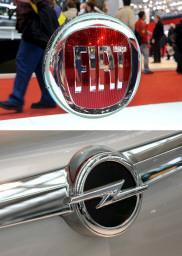Fiat on Wednesday was set to present its non-cash bid for Opel to the German government and the automaker's parent company, General Motors of the United States.
An 18:00 (16:00GMT) deadline to present offers was extended by the German government, according to the German DPA news agency, apparently on a request from Fiat.
Acquiring Opel is part of a plan by Fiat CEO Sergio Marchionne to merge the operations of Fiat Auto, Opel Chrysler and create a global automotive player on the level of Japan's Toyota and Volkswagen of Germany.
He has already hammered out a non-cash deal for control of Chrysler by offering the Italian automaker's cutting-edge green and small car technology to the Detroit No.3.
Marchionne told Bloomberg TV on Tuesday that Fiat's offer for Opel would be based ''on a lot of assets. Assets which produce cash and which are better than cash. Cash can run out, while assets which produce cash do not''.
On paper this may mean that Fiat has not met one of the conditions which the German government set for potential bidders: that they inject their own capital and cash.
The other conditions included guaranteeing a future for Opel's factories and workers, as well ensuring its technological development.
Fiat' main rival for Opel is Austrian-Canadian auto parts maker Magna International, which has reportedly allied with Russian carmaker GAZ and appears to have support from the regional governments where Opel has factories and from the automakers' unions
Magna is also reported to be interested in GM's semi-independent American marque Saturn, which uses Opel platforms and technology, that the Detroit No.1 has decided to drop as part of a major restructuring plan in order to qualify for federal bail-out funds.
According to reports in the press, Magna intends to lease out Opel's plans and work force to other automakers so they can quickly produce and place new models on the market.
A third offer for Opel is believed to have come from the Brussels arm of the American private equity fund Ripplewood.
Fiat's negotiations for Opel have been difficult due to the fears of unions in Germany and Italy that a merger will lead to plant closings and layoffs in both countries.
Fiat has said it intends to keep plants of both carmakers open.
In his interview to Bloomberg, Marchionne observed that ''the question of job cuts does not have to do with just Opel but the whole automobile industry''.
''In Europe, as in the US, there is a problem of an excess labor force and this must be resolved in a European context,'' he added.









